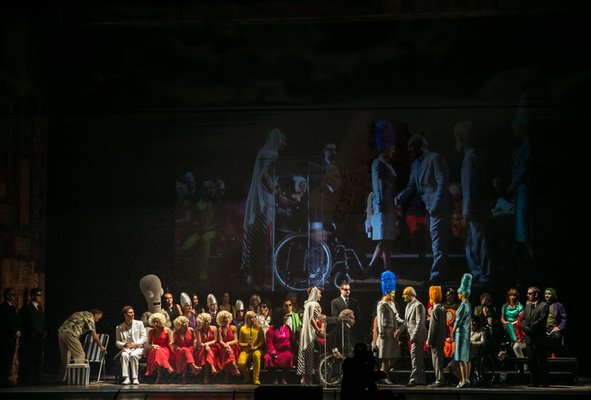
MARIO AND THE MAGICIAN / BLUEBEARD'S CASTLE
3 April 2025, 6 p.m.
In Brief
One act operas, in Hungarian, with Hungarian and English surtitles
How far do we let other people into our minds, our soul, and our past? And what happens if someone pushes their way into our consciousness even though we haven't let them in? Béla Bartók and Béla Balázs's world-famous opera offers insight into the various layers and stages of the relationship between men and women, while János Vajda's work based on the famous novella by Thomas Mann depicts the effects of blind extremism and mass hypnosis. Two brilliant 20th century one-act operas in one evening: both Hungarian, and both about the deepest functioning of the human mind and how the psyche can be influenced.
Details
- Location
- Hungarian State Opera
- Date
- April 3, 2025
- Start time
- 6 p.m.
- End time
- 10 p.m.
Mario and the Magician
"You do what you like. Or is it possible you have ever not done what you liked – or even, maybe, what you didn't like?" The atmosphere is an unpleasant one in this memory of Torre de Venere. The audience members at an Italian resort town fall, against their will, under the influence of a remarkable magician – with the exception of one person.
"Tolerance becomes a crime when applied to evil," said Thomas Mann, whose highly influential novel Mario and the Magician János Vajda use as the basis for his opera of the same name, one of the most successful and affecting works in modern Hungarian opera history. The work will be shown at the Opera House in a production directed by Péter Galambos, with Krisztián Cser in the principal role.
Bluebeard's Castle
Synopsis
It is a stormy summer night in Torre di Venere.
Bluebeard’s Castle
- We have arrived.
Here you see the Bluebeard's castle.
Judit, are you still following me?
- I have left my father, mother,
I have left my fair brother,
I have left my fiancé,
to be with you in your castle.
- Now the door shall be closed.
- Dark and sombre is your castle.
Water oozes from the arches!
Tearful castle, weeping castle!
- Why have you come with me, Judit?
- Winds shall wander, sun shall sparkle.
Radiance shall fill your castle!
- I see big, bolted doors,
Seven black, bolted doors.
Every door must now be opened!
Winds shall wander, sun shall sparkle!
I shall ease it open, myself.
Bluebeard, give the key now,
give the key now, for I love you!
1.
- That's my torture chamber, Judit.
- Dreadful sight, your torture chamber!
- Are you frightened?
- No. I am not.
Give me the other keys!
- Take care of us, Judit.
2.
- That's my armoury house, Judit.
- Blood is dripping from your armour.
- Are you frightened?
- Give me all your keys!
- Take care of us, Judit!
- I followed you, for I love you.
Now open every door and chamber!
- I will give you three more keys.
Whatever you'll see, never question.
3.
- That is my castle's treasure chamber!
- Bloodstain blacken all your treasures!
4.
- That is my castle's secret garden.
- All your flower-beds are bleeding!
- Look, how bright is now my castle!
5.
- Look, this is my great realm.
Dawn and sundown are our neighbours.
Sun and moon and stars are neighbours.
- I see clouds with bloody shadows.
- Look, how bright is my castle!
Blessed are your hands, blessed.
- But two doors are still unopened.
- Come, I want you, kiss me, kiss me!
- Open the two doors!
- Take care, take care of my castle,
we shall never see it brighter.
- I live for you, I die for you, Bluebeard!
- I will give you one more key.
6.
- There's a lake here, white and silent.
What lake is it, Bluebeard?
- Tears, Judit, tears, tears.
- The last door I won't open.
- Bluebeard, do you love me truly?
- Kiss me, kiss me, never question.
- Whom have you loved before me?
- Kiss me, kiss me, never question.
- Was she like me? Fairer than me?
- Love me, Judit, never question.
- I do know now, Bluebeard,
what the seventh door is hiding.
That door hides the other women,
murdered, blackened, bloody corpses.
Open up the seventh door!
7.
- See the other women, Judit,
see them whom I loved.
Sunrise brought the first one for me.
She is queen of every sunrise.
Noon-time brought the next one for me,
she is queen of every noon-time.
Evening brought the third one for me,
she is queen of every evening.
Night brought the fourth one for me.
You are queen of every night now.
- Bluebeard, I don't want it!
- You were the most beautiful of them all!
And from now on it will be night for ever... night...
(Compiled from the poem by Béla Balázs by: Judit Kenesey)
Gallery
Reviews
"The staging was entrancing, and the music very telling: As the public becomes more fascinated and controlled by Cipolla, the music becomes more popular, more accessible and danceable."
Eric A. Gordon, People’s World
"The curtain solutions used in Mario are perfectly suited to the mood of the gloomy story; we see a painted castle, a palace corridor, a garden. The scene is reminiscent of a baroque theater, while a veiled light shines throughout. Bluebeard arrives with his wife among the walls that non-figuratively evoke the world of Egyptian paintings. The individual chambers appear with the lighting behind the painted drapery as a wall: the torture chamber, the armoury, and then the treasury..."
Károly Fülöp, Operavilág


